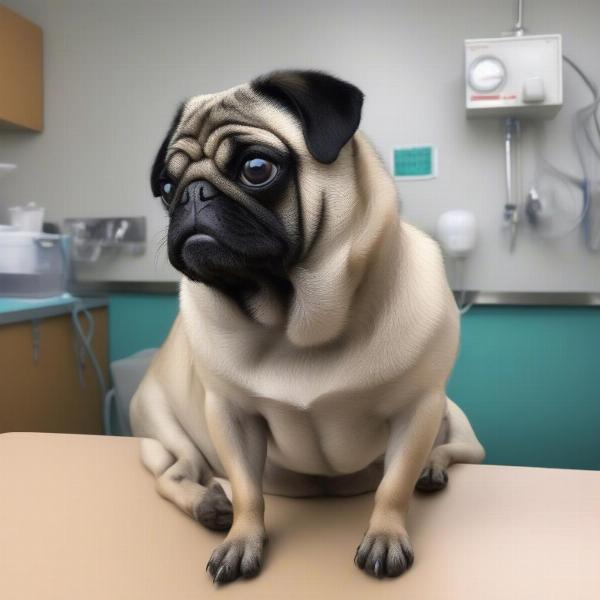Dog huffing, a short, forceful exhale of breath through the nose, can be a normal canine behavior or a sign of something more serious. Understanding the difference is key to ensuring your furry friend’s well-being. This article will explore the various reasons why your dog might be huffing, from simple excitement to potential health concerns, and provide practical advice on how to respond.
Is Dog Huffing Normal?
Sometimes, dog huffing is perfectly normal. It’s often a way for dogs to communicate and express themselves, similar to a sigh in humans. A dog might huff after a playful romp in the park, indicating contentment and relaxation. They might also huff when settling down for a nap, signaling they’re comfortable and ready to sleep. These types of huffs are usually accompanied by relaxed body language, such as a loose posture and a wagging tail.
When Should I Worry About My Dog Huffing?
While many huffs are harmless, excessive or unusual huffing can sometimes be a symptom of an underlying health issue. If your dog is huffing more frequently than usual, or if the huffing is accompanied by other symptoms like labored breathing, coughing, sneezing, or nasal discharge, it’s essential to consult a veterinarian.
Health Concerns Related to Dog Huffing
 Dog huffing with difficulty breathing
Dog huffing with difficulty breathing
Several medical conditions can cause increased huffing in dogs. These include:
- Respiratory Infections: Like humans, dogs can get colds and other respiratory infections that can cause inflammation and congestion in the airways, leading to huffing and difficulty breathing.
- Allergies: Environmental allergens like pollen, dust, and mold can trigger allergic reactions in dogs, leading to sneezing, coughing, and huffing.
- Brachycephalic Syndrome: Breeds with short noses, such as Pugs, French Bulldogs, and English Bulldogs, are prone to breathing problems due to their narrowed airways. This can result in frequent huffing and snorting.
- Heart Conditions: Heart disease can make it difficult for a dog to breathe efficiently, causing huffing and other respiratory distress.
- Heatstroke: Dogs can overheat quickly, especially in hot and humid weather. Huffing and excessive panting are common signs of heatstroke, a serious condition that requires immediate veterinary attention.
- Pain: Dogs experiencing pain, especially in the chest or abdomen, may huff as a way to cope with the discomfort.
What to Do If Your Dog Is Huffing Excessively
If you’re concerned about your dog’s huffing, the best course of action is to contact your veterinarian. They can perform a thorough examination to determine the underlying cause and recommend appropriate treatment. Be prepared to provide your vet with details about your dog’s huffing, including when it started, how often it occurs, and any other accompanying symptoms.
Deciphering Your Dog’s Huffs
Paying close attention to your dog’s overall behavior and body language can help you distinguish between normal and concerning huffs. A relaxed posture, wagging tail, and playful demeanor often indicate that the huffing is simply a form of communication or a sign of contentment. However, if your dog seems distressed, lethargic, or is exhibiting other unusual symptoms, it’s crucial to seek veterinary care.
Conclusion
Understanding the different reasons behind dog huffing is a vital part of responsible pet ownership. While many huffs are harmless and simply a part of normal canine communication, excessive or unusual huffing can be a sign of a more serious issue. By paying close attention to your dog’s behavior and seeking veterinary care when necessary, you can help ensure your furry friend stays healthy and happy.
FAQ
- Is it normal for a dog to huff while sleeping? Yes, occasional huffing during sleep is often normal and can be a sign of relaxation.
- My dog huffs after exercise. Is this something to worry about? Huffing after exercise is usually a way for dogs to cool down and regulate their breathing. However, if the huffing is excessive or prolonged, it’s best to consult a vet.
- What are the signs of heatstroke in dogs? Signs of heatstroke include excessive panting, huffing, drooling, weakness, vomiting, and collapse.
- Can allergies cause a dog to huff? Yes, allergies can lead to inflammation and congestion in the airways, causing huffing and other respiratory symptoms.
- My dog is huffing and coughing. What should I do? If your dog is huffing and coughing, it’s important to contact your veterinarian as soon as possible, as this could indicate a respiratory infection or other medical condition.
- How can I tell if my dog’s huffing is serious? Look for accompanying symptoms like labored breathing, nasal discharge, lethargy, or changes in behavior. If you’re concerned, consult a vet.
- What are some common treatments for dog huffing? Treatment depends on the underlying cause and can range from medications for allergies or infections to surgery for brachycephalic syndrome.
ILM Dog is your trusted resource for expert advice on all aspects of dog care. From breed selection and puppy care to senior dog care and health issues, we’re here to help you provide the best possible care for your furry companion. We offer comprehensive information on dog breeds, health, training, nutrition, grooming, exercise, travel, and products. Our expert team provides valuable insights and practical tips to ensure your dog’s well-being. Contact us today for personalized guidance: Email: [email protected], Phone: +44 20-3965-8624. Visit ILM Dog for more helpful resources and connect with our community of passionate dog lovers.